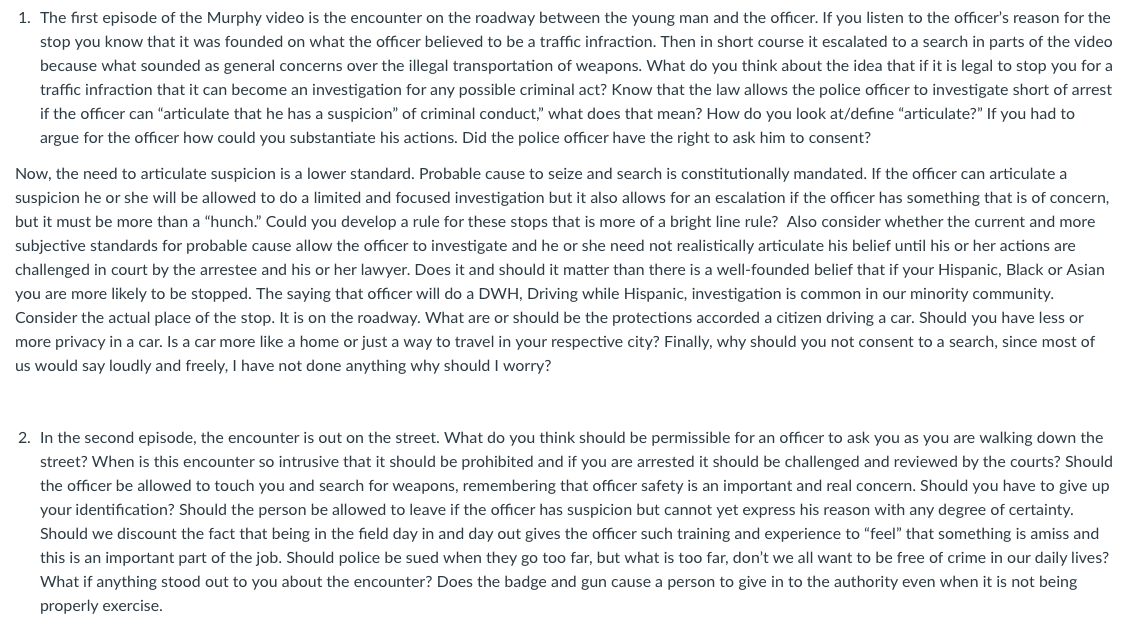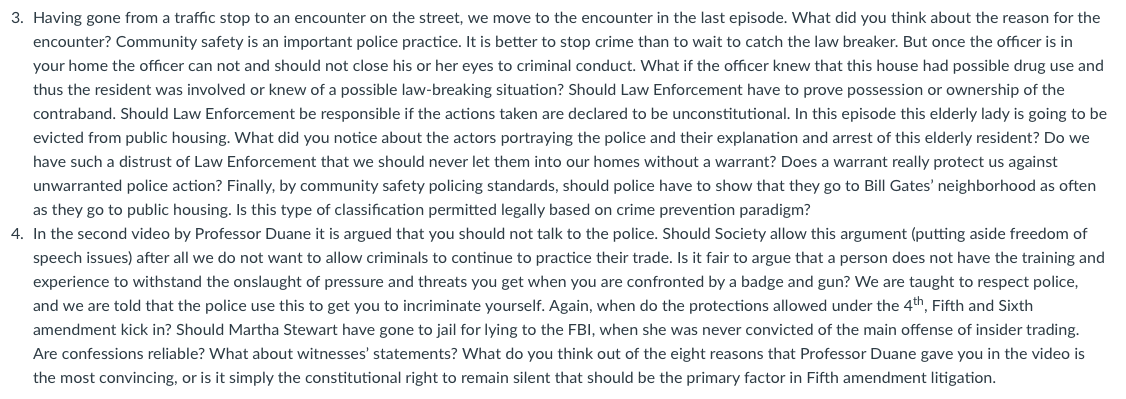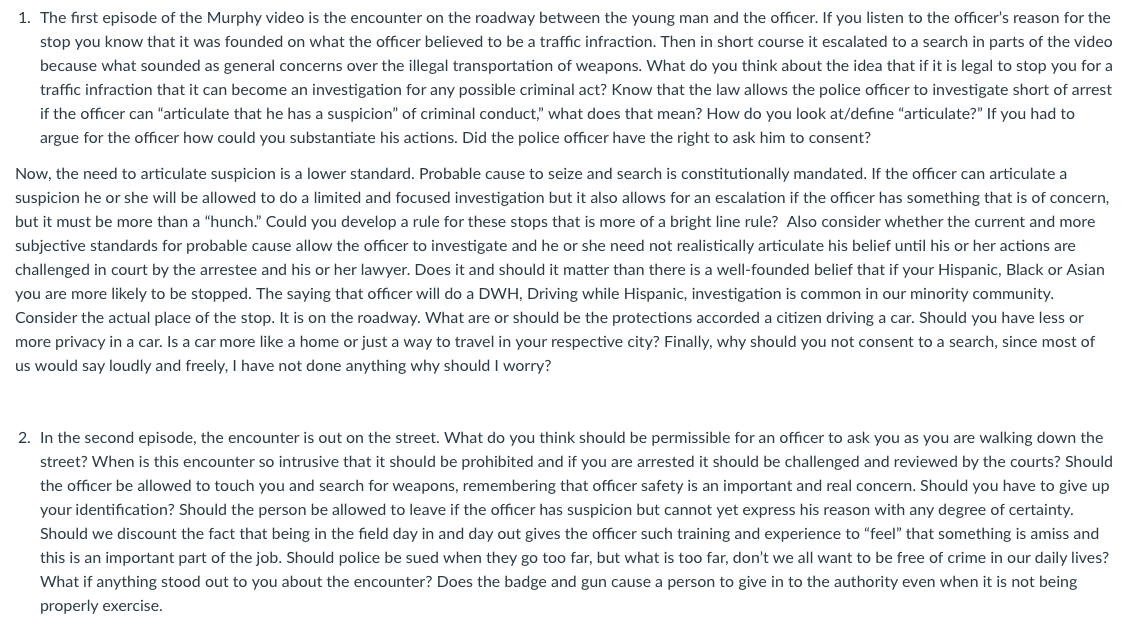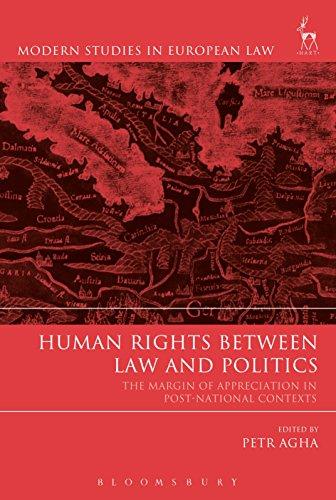

Can you help with these questions.
1. The first episode of the Murphy video is the encounter on the roadway between the young man and the officer. If you listen to the officer's reason for the stop you know that it was founded on what the officer believed to be a traffic infraction. Then in short course it escalated to a search in parts of the video because what sounded as general concerns over the illegal transportation of weapons. What do you think about the idea that if it is legal to stop you for a traffic infraction that it can become an investigation for any possible criminal act? Know that the law allows the police officer to investigate short of arrest if the officer can "articulate that he has a suspicion" of criminal conduct," what does that mean? How do you look at/define "articulate?" If you had to argue for the officer how could you substantiate his actions. Did the police officer have the right to ask him to consent? Now, the need to articulate suspicion is a lower standard. Probable cause to seize and search is constitutionally mandated. If the officer can articulate a suspicion he or she will be allowed to do a limited and focused investigation but it also allows for an escalation if the officer has something that is of concern, but it must be more than a "hunch." Could you develop a rule for these stops that is more of a bright line rule? Also consider whether the current and more subjective standards for probable cause allow the officer to investigate and he or she need not realistically articulate his belief until his or her actions are challenged in court by the arrestee and his or her lawyer. Does it and should it matter than there is a well-founded belief that if your Hispanic, Black or Asian you are more likely to be stopped. The saying that officer will do a DWH, Driving while Hispanic, investigation is common in our minority community. Consider the actual place of the stop. It is on the roadway. What are or should be the protections accorded a citizen driving a car. Should you have less or more privacy in a car. Is a car more like a home or just a way to travel in your respective city? Finally, why should you not consent to a search, since most of us would say loudly and freely, I have not done anything why should I worry? 2. In the second episode, the encounter is out on the street. What do you think should be permissible for an officer to ask you as you are walking down the street? When is this encounter so intrusive that it should be prohibited and if you are arrested it should be challenged and reviewed by the courts? Should the officer be allowed to touch you and search for weapons, remembering that officer safety is an important and real concern. Should you have to give up your identification? Should the person be allowed to leave if the officer has suspicion but cannot yet express his reason with any degree of certainty. Should we discount the fact that being in the field day in and day out gives the officer such training and experience to "feel" that something is amiss and this is an important part of the job. Should police be sued when they go too far, but what is too far, don't we all want to be free of crime in our daily lives? What if anything stood out to you about the encounter? Does the badge and gun cause a person to give in to the authority even when it is not being properly exercise.3. Having gone from a trafc stop to an encounter on the street, we move to the encounter in the last episode. What did you think about the reason for the encounter? Community safety is an important police practice. It is better to stop crime than to wait to catch the law breaker. But once the ofcer is in your home the ofcer can not and should not close his or her eyes to criminal conduct. What if the ofcer knew that this house had possible drug use and thus the resident was involved or knew of a possible law-breaking situation? Should Law Enforcement have to prove possession or ownership of the contraband. Should Law Enforcement be responsible if the actions taken are declared to be unconstitutional. In this episode this elderly lady is going to be evicted from public housing. What did you notice about the actors portraying the police and their explanation and arrest of this elderly resident? Do we have such a distrust of Law Enforcement that we should never let them into our homes without a warrant? Does a warrant really protect us against unwarranted police action? Finally, by community safety policing standards. should police have to show that they go to Bill Gates' neighborhood as often as they go to public housing. Is this type of classication permitted legally based on crime prevention paradigm? 4. In the second video by Professor Duane it is argued that you should not talk to the police. Should Society allow this argument [putting aside freedom of speech issues) after all we do not want to allow criminals to continue to practice their trade. Is it fair to argue that a person does not have the training and experience to withstand the onslaught of pressure and threats you get when you are confronted by a badge and gun? We are taught to respect police, and we are told that the police use this to get you to incriminate yourself. Again. when do the protections allowed under the 4\". Fifth and Sixth amendment kick in? Should Martha Stewart have gone to jail for lying to the FBI, when she was never convicted of the main offense of insider trading. Are confessions reliable? What about witnesses' statements? What do you think out of the eight reasons that Professor Duane gave you in the video is the most convincing. or is it simply the constitutional right to remain silent that should be the primary factor in Fifth amendment litigation










